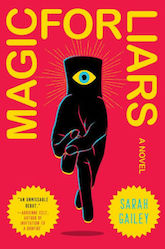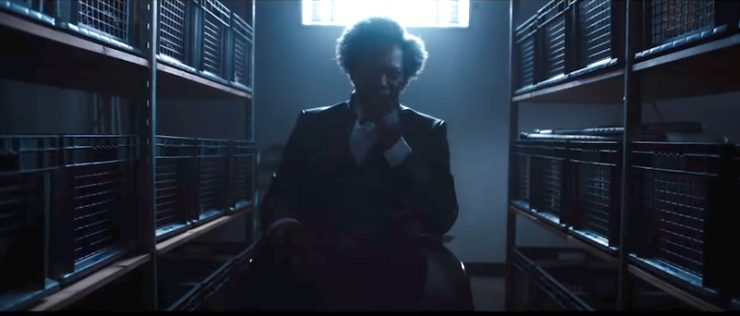M. Night Shyamalan has had nearly twenty years to perfect any ideas he may have been tossing around for an Unbreakable sequel, and following the success of Split—which was set in the same universe—it was only a matter of time before Mr. Glass and David Dunn resurfaced. Sadly, everything that made Unbreakable one of the better ruminations on superhero archetypes on film is missing from Glass, which despite impressive performances manages to be neither as surprising, nor as thoughtful, as its predecessor.
[Spoilers for Glass, Split, and Unbreakable contained within.]
It doesn’t help that there are several issues with the very foundation of this fictional universe, particularly the ableism with which both Elijah Price (or Mr. Glass, still played with gleeful cunning by Samuel L. Jackson) and Kevin Wendell Crumb (or The Horde, a stunning and constant rotisserie of postures and voices from James McAvoy) have been portrayed from the start. Try as Shyamalan may to make both characters sympathetic, there’s no way to get around the fact that both of these men—pointedly the “villains” of the story—have disabilities that are in some way directly responsible for their choice to murder people. If the same were true for David Dunn (Bruce Willis’s pensive and largely silent hero), the story wouldn’t come off quite so blatantly callous toward people with disabilities, but the narrative draws a very direct line between Elijah’s brittle bone disease and his choice to commit mass murder to find/create a heroic counterpart, as well as Kevin’s Dissociative Identity Disorder and his desire to murder young women.
This is further complicated by the presence of Casey Cooke (Anya Taylor-Joy), the one victim who The Horde chose to spare in Split after realizing that she had suffered and was therefore “pure” in their eyes. Casey is clearly battling with Stockholm syndrome in this story, but the film treats her affection for Kevin like deep and abiding love. Romantic or not, which is never quite made clear, their connection is taken at face value rather than carefully considered and dissected. The same can be said for David’s son Joseph (Spencer Treat Clark) and Elijah’s mother Mrs. Price (Charlayne Woodard), who exist more as sounding boards for David and Elijah through the film than they do as family with thoughtful and intricate ties.
The other problem with Glass lies in its sheer lack of subtlety. While M. Night Shyamalan’s oeuvre has never been particularly subdued overall, Unbreakable manages to walk a fine line; the audience can never entirely be sure if David Dunn and Elijah Price truly are superhuman, and it remains a unique blip on the superhero cinematic radar by virtue of this strength. Unfortunately, Glass leaves no room for doubt, and does so for no good reason. The overall theme of the film would have held up without a seismic reveal, and would have left its progenitor beautifully intact.
Adding to the irritation is the use of a depressingly overt antagonist in Sarah Paulson’s Dr. Ellie Staple. Staple’s goal—to convince all three men that they suffer from delusions rather than superhuman abilities—could have been a fascinating tack to take if the film had settled for ambiguity in the longterm, and made it harder for the audience to decide who to believe. But because she acts in a manner that is entirely unethical from a medical standpoint—from imprisonment to torture to forcing one of her patients to undergo a medical procedure without any form of sign-off or consent—it’s plain from that start that she is the one to be wary about.
Buy the Book


Magic for Liars
Shyamalan’s scripts are often laden with Lucasian clichés and hyperbole, but Glass takes it one step further by continually calling out all the comic book tropes it is paying homage to as they are happening. In Unbreakable, this was meant to be a signal to the audience that something was off about Elijah Price, but in Glass, it only serves to over-inform the viewer about developments that they could enjoyably suss out for themselves. Any elegant twists and turns that Glass might have had are bulldozed by Mr. Glass happily informing us of our next narrative pitfall. And while Shyamalan is able (in Unbreakable) to portray the everyday everyman heroics of an average guy like David Dunn, it becomes instantly clear that he has no idea how to make Mr. Glass into the genius mastermind that the story claims he is. All of his tricks are easy to guess before they’re revealed, all of his skills sloppily rendered. (If I never see another movie where someone rapidly drums on a keyboard and comes out with endless lines of perfect computer code without ever having to delete or reenter a single stroke, I will count myself harmonious with the universe.)
Because the film telegraphs so much, it is difficult to get lost in the impactful moments that it does achieve. There are questions that the story is asking its viewer, ideas that it’s trying to impart amid the overwrought tangle of entertainment it crams down our throats. At the back of the film, desperately waving for attention, are a few concise thoughts about refusing to let the people around us define who we are. At its core, Glass wants to assure us that the world gets no say in whether or not we’re extraordinary. That power is ours to own, and requires no verification from those who would make themselves arbiters of human achievement. And that’s an empowering and lovely message, really. It’s just a shame that Glass doesn’t deliver that message with the thoughtfulness and patience it could have wielded.
With all these problems muddling an otherwise clever endnote, it’s easy to look back at Unbreakable and wish that M. Night Shyamalan had understood what made that film so surprising. At the precipice of superhero saturation, his first foray into the genre chose not to display feats of might, but to ask us what qualified as feats of might. It pointed out that perhaps these colorful tales of superheroes and supervillains resonated with us because we all cast ourselves as these roles from time to time. And it refused to make power a simple crescendo of fists and explosions. While Glass is still wonderfully tame compared to our typical action juggernauts, it failed to capture the thoughtfulness that made such a mark on the archetypes it attempted to encompass almost twenty years ago.
Emmet Asher-Perrin was really impressed with grown up Spencer Treat Clark in this, though. You can bug him on Twitter, and read more of her work here and elsewhere.










